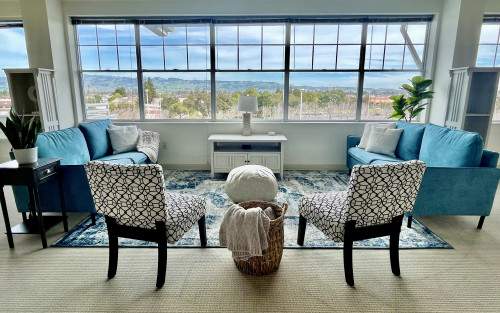



Willa Wellness Center
Treatment Focus
You can get treatment for eating disorders at this center, helping you navigate symptoms, build coping tools, and restore your physical health under expert care.
Primary Level of Care
Outpatient treatment offers flexible therapeutic and medical care without the need to stay overnight in a hospital or inpatient facility. Some centers off intensive outpatient program (IOP), which falls between inpatient care and traditional outpatient service.
This provider hasn't verified their profile's information. Are you the owner of this center? Claim your listing to better manage your presence on Recovery.com.
Treatment Focus
You can get treatment for eating disorders at this center, helping you navigate symptoms, build coping tools, and restore your physical health under expert care.
Primary Level of Care
Outpatient treatment offers flexible therapeutic and medical care without the need to stay overnight in a hospital or inpatient facility. Some centers off intensive outpatient program (IOP), which falls between inpatient care and traditional outpatient service.
Private Pay
You pay directly for treatment out of pocket. This approach can offer enhanced privacy and flexibility, without involving insurance. Exact costs vary based on program and length of stay. Contact the center for specific details.
Willa Wellness Center
Willa Wellness Center
About Willa Wellness Center
Set in the North Bay area, Willa Wellness Center in Petaluma provides care for women and teen girls aged 15 and older who are experiencing eating disorders such as anorexia, bulimia, binge eating, avoidant/restrictive food intake disorder (ARFID), and other specified feeding or eating disorder (OSFED). The center offers day (PHP) and intensive outpatient (IOP) treatment.
Both treatment tracks follow a non-diet, evidence-based, and trauma-informed approach. In other words, the team helps clients heal from harmful patterns and beliefs about food, rather than focusing on food intake.
Multidisciplinary Care
Willa Wellness Center combines medical, psychological, and nutritional therapies to support recovery. Clients receive weekly individual therapy, psychiatric care, and nutrition counseling. Therapies include acceptance and commitment therapy (ACT), cognitive behavioral therapy (CBT), dialectical behavior therapy (DBT), and eye movement desensitization and reprocessing (EMDR).
Additional experiences such as mindful movement, body-positive yoga, and art therapy help support both physical and emotional healing. The center also helps clients create continuing care plans to support long-term wellness.
Structured Yet Individualized Care
A typical day at Willa Wellness Center begins at 8:30 a.m. and follows a structured, supportive schedule. Clients share breakfast, then join group check-ins and therapy sessions like DBT and body image work. Later in the day, they participate in mindful movement, reflection, and individual therapy, with meals and snacks integrated to support healing.
Optional, Comfortable Lodging
For clients visiting from out of town or seeking a healing space away from home, Willa Wellness offers fully furnished one-bedroom apartments near the treatment center. These apartments include cable, grocery delivery, housekeeping, laundry service, and Wi-Fi, providing a calm, supportive place to focus on recovery.
Center Overview
Treatment Focus
You can get treatment for eating disorders at this center, helping you navigate symptoms, build coping tools, and restore your physical health under expert care.

Pricing and Program Length
Estimated Center Costs
Center pricing can vary based on program and length of stay. Contact the center for more information. Recovery.com strives for price transparency so you can make an informed decision.
Levels of Care





Your Care Options
Specializations
Eating Disorders
An eating disorder is a long-term pattern of unhealthy behavior relating to food. Most people with eating disorders have a distorted self-image.
Who We Treat
Adolescents
Teens receive the treatment they need for mental health disorders and addiction, with the added support of educational and vocational services.
Women only
Women attend treatment in a gender-specific facility, with treatment delivered in a safe, nourishing, and supportive environment for greater comfort.
Approaches
Holistic
A non-medicinal, wellness-focused approach that aims to align the mind, body, and spirit for deep and lasting healing.
Evidence-Based
A combination of scientifically rooted therapies and treatments make up evidence-based care, defined by their measured and proven results.
Therapies
1-on-1 Counseling
Patient and therapist meet 1-on-1 to work through difficult emotions and behavioral challenges in a personal, private setting.
Acceptance and Commitment Therapy (ACT)
This cognitive behavioral therapy teaches patients to accept challenging feelings and make the appropriate changes to reach personal goals.
Art Therapy
Visual art invites patients to examine the emotions within their work, focusing on the process of creativity and its gentle therapeutic power.
Meditation & Mindfulness
A practiced state of mind that brings patients to the present. It allows them to become fully aware of themselves, their feelings, and the present moment.
Nutrition Counseling
Nutritious food helps patients heal from within, setting them up for mental and bodily wellness as they learn about healthy eating.
Eye Movement Therapy (EMDR)
Lateral, guided eye movements help reduce the emotional reactions of retelling and reprocessing trauma, allowing intense feelings to dissipate.
Conditions We Treat
Eating Disorders
An eating disorder is a long-term pattern of unhealthy behavior relating to food. Most people with eating disorders have a distorted self-image.
Languages
Care Designed for Your Needs
Personal Amenities
Amenities
Special Considerations






